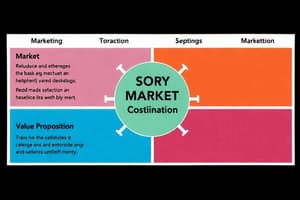Podcast
Questions and Answers
What is the primary purpose of marketing?
What is the primary purpose of marketing?
- To create value for customers, clients, partners, and society (correct)
- To establish brand loyalty
- To maximize profits for businesses
- To increase competition among businesses
Which of the following needs is the highest in Maslow's Hierarchy of Needs?
Which of the following needs is the highest in Maslow's Hierarchy of Needs?
- Safety needs
- Esteem needs
- Self-actualization (correct)
- Belongingness and love needs
In marketing, which term describes a human want backed by purchasing power?
In marketing, which term describes a human want backed by purchasing power?
- Need
- Desire
- Exchange
- Demand (correct)
What encompasses the scope of marketing related to intangible rights of ownership?
What encompasses the scope of marketing related to intangible rights of ownership?
Which of the following represents a physiological need according to Maslow?
Which of the following represents a physiological need according to Maslow?
Which category of marketing does celebrity promotion fall under?
Which category of marketing does celebrity promotion fall under?
What best describes an exchange in marketing?
What best describes an exchange in marketing?
Which of the following best describes the term 'market'?
Which of the following best describes the term 'market'?
What is the main focus of the production concept in traditional marketing?
What is the main focus of the production concept in traditional marketing?
Which concept emphasizes the organization's need to satisfy consumer needs while benefiting society?
Which concept emphasizes the organization's need to satisfy consumer needs while benefiting society?
How do goals differ from objectives in marketing?
How do goals differ from objectives in marketing?
What does the acronym SMART stand for in marketing objectives?
What does the acronym SMART stand for in marketing objectives?
What is a key characteristic of the sales concept in marketing?
What is a key characteristic of the sales concept in marketing?
What does the relationship marketing concept prioritize?
What does the relationship marketing concept prioritize?
Which marketing concept focuses primarily on creating products without understanding market needs?
Which marketing concept focuses primarily on creating products without understanding market needs?
Which is NOT a characteristic of SMART objectives?
Which is NOT a characteristic of SMART objectives?
What characterizes goals in marketing according to best practices?
What characterizes goals in marketing according to best practices?
Which of the following is NOT a characteristic of a not-for-profit organization?
Which of the following is NOT a characteristic of a not-for-profit organization?
Which type of marketing focuses on attracting tourists to a specific location?
Which type of marketing focuses on attracting tourists to a specific location?
What does KPI stand for, and what is its purpose?
What does KPI stand for, and what is its purpose?
What should marketing goals ideally be based on?
What should marketing goals ideally be based on?
Which of the following is an example of a noteworthy marketing goal?
Which of the following is an example of a noteworthy marketing goal?
What aspect of marketing does person marketing primarily focus on?
What aspect of marketing does person marketing primarily focus on?
Why might a not-for-profit organization have some degree of monopoly power?
Why might a not-for-profit organization have some degree of monopoly power?
Which of these is NOT a key element in the 'Guidelines for Cause Marketing Campaigns'?
Which of these is NOT a key element in the 'Guidelines for Cause Marketing Campaigns'?
What is a key factor to consider when choosing a cause to support for a cause marketing campaign?
What is a key factor to consider when choosing a cause to support for a cause marketing campaign?
Which of the following is NOT a characteristic of effective event marketing?
Which of the following is NOT a characteristic of effective event marketing?
What is the most important element of 'green marketing' according to the text?
What is the most important element of 'green marketing' according to the text?
What is a key aspect of 'educating customers' in green marketing?
What is a key aspect of 'educating customers' in green marketing?
Which of the following is an example of an event that could fall under event marketing?
Which of the following is an example of an event that could fall under event marketing?
Which of these is NOT cited as a benefit of effective cause marketing campaigns?
Which of these is NOT cited as a benefit of effective cause marketing campaigns?
What is the main purpose of event marketing?
What is the main purpose of event marketing?
Flashcards
Organizations
Organizations
Groups that work to create a positive public image.
Production Concept
Production Concept
A marketing strategy focusing on internal company capabilities rather than market needs.
Sales Concept
Sales Concept
The belief that more products will sell through personal selling and advertising.
Marketing Concept
Marketing Concept
Signup and view all the flashcards
Relationship Marketing
Relationship Marketing
Signup and view all the flashcards
Societal Marketing Concept
Societal Marketing Concept
Signup and view all the flashcards
Goals vs Objectives
Goals vs Objectives
Signup and view all the flashcards
SMART Objectives
SMART Objectives
Signup and view all the flashcards
Marketing
Marketing
Signup and view all the flashcards
Needs
Needs
Signup and view all the flashcards
Wants
Wants
Signup and view all the flashcards
Demands
Demands
Signup and view all the flashcards
Exchange
Exchange
Signup and view all the flashcards
Market
Market
Signup and view all the flashcards
Maslow's Hierarchy of Needs
Maslow's Hierarchy of Needs
Signup and view all the flashcards
Scope of Marketing
Scope of Marketing
Signup and view all the flashcards
KPI
KPI
Signup and view all the flashcards
Attainable Goals
Attainable Goals
Signup and view all the flashcards
Consistent Goals
Consistent Goals
Signup and view all the flashcards
Comprehensive Goals
Comprehensive Goals
Signup and view all the flashcards
Intangibility of Goals
Intangibility of Goals
Signup and view all the flashcards
Not-for-Profit Marketing
Not-for-Profit Marketing
Signup and view all the flashcards
Person Marketing
Person Marketing
Signup and view all the flashcards
Cause Marketing
Cause Marketing
Signup and view all the flashcards
Cause Marketing Campaigns
Cause Marketing Campaigns
Signup and view all the flashcards
Support Reputable Causes
Support Reputable Causes
Signup and view all the flashcards
Maintain Transparency
Maintain Transparency
Signup and view all the flashcards
Event Marketing
Event Marketing
Signup and view all the flashcards
Goal Oriented (Event Marketing)
Goal Oriented (Event Marketing)
Signup and view all the flashcards
Green Marketing
Green Marketing
Signup and view all the flashcards
Genuine Green Practices
Genuine Green Practices
Signup and view all the flashcards
Educating Customers
Educating Customers
Signup and view all the flashcards
Study Notes
Marketing Principles and Strategies
- Marketing is the activity of institutions and processes for creating, communicating, delivering, and exchanging offerings that have value for customers, clients, partners, and society at large.
- A human need is something a person must have to live and survive.
- A human want is something a person desires to have.
- Demands are human wants that are supported by buying power.
- Marketing occurs when the buyer and seller trade something of equal value, satisfying unmet needs.
- A market is composed of people with both desire and ability to buy a product or service.
Needs and Wants
-
Needs: Hunger, Fashion Wear, Infection, Shelter, Thirst, Transportation
-
Food, Clothing, Antibiotics, Housing, Beverage/Water/Milk, Vehicle
-
Wants: Sports, Entertainment, Education, Security, Interment
-
Television, Radio, DVD/Discs/Casinos, School/Seminars/Course, Insurance/Memorial Services
Scope of Marketing
- Goods: Physical goods comprise the volume of most countries' production and marketing effort.
- Services: As economies progress, a growing proportion of activities is concentrated on producing services.
- Experiences: Combining services and goods can generate, stage, and market experiences.
- Events: Marketers endorse time-based events.
- Persons: Celebrity marketing is a popular business.
- Places: Place marketing involves economic development specialists, real estate, commercial banks, local business associations, and advertising/PR agencies.
- Properties: Intangible rights of ownership.
- Organizations: Organizations work hard to create a strong, positive image in the public's mind.
- Information: Production, packaging, and distribution of information are important industries.
- Ideals: Each market offering has a fundamental idea at its core.
Traditional Approaches to Marketing
- Traditional concept marketing is a strategy used to determine if a company can produce a viable product consumers want or need, if a company can produce enough of it to fill the need, and the method by which the need can be fulfilled.
- Possible approaches include: Production, Sales, Marketing, Relationship, and Societal.
Goals of Marketing
- Marketing goals are statements of desired results companies want to achieve with marketing efforts. Similar to other goals, they should be clear.
- Objectives are specific, measureable, attainable, relevant, and time-bound (SMART), giving direction and defining commercial targets to track performance against.
- Key Performance Indicators (KPIs) are specific metrics that track progress towards meeting objectives.
Developing Marketing Goals
- Goals should be attainable, consistent, comprehensive, and not confused with other concepts like strategies or objectives.
Examples of Noteworthy Marketing Goals
- Identifying the target market.
- Increasing sales and profit.
- Increasing brand awareness.
- Increasing market share.
- Countering competitive strategies.
- Building reputation.
- Expanding distribution channels.
Contemporary Approaches to Marketing
- Not-for-Profit Organization Marketing: A type of organization that does not aim for profit. They allocate earned money to their objectives.
- Characteristics : Generate revenue, compete with other organizations, market to multiple publics, and often possess a monopoly power in a geographic area.
- Person Marketing: Cultivating attention, interest, and preferences of a target market towards a celebrity.
- Place Marketing: Attaining a pull towards customers in specific areas, showcase beautiful spots, promote sites for starting a business.
- Cause Marketing: Recognition and marketing of social issues, causes, or ideas, increasing awareness, like addressing literacy, physical fitness, child obesity, environmental protection.
- Event Marketing: The promotion of sports, culture, and charity activities through sponsorships and public awareness.
- Includes mega events, local events, exhibitions, trade shows, publicity stunts, themed and created events, corporate entertainment, and award ceremonies.
Green Marketing
- Selling products and/or services based on their environmental benefits.
- Key aspects to make it effective: Be genuine (actions aligning with claims), educating customers about why it matters, giving opportunities to participate through personalized benefits in positive environmental action.
Event Marketing
- Supporting a wide range of events (mega, exhibitions, trade shows) as a promotional method.
- Goal-oriented with effective communication to target audiences.
- Proper evaluation to improve future performance.
Studying That Suits You
Use AI to generate personalized quizzes and flashcards to suit your learning preferences.




